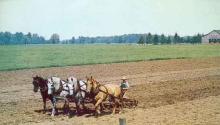An Old Order Mennonite farmer in Waterloo Region, Ont., works the fields by horsepower in 1950, much as his 19th-century counterparts would have done. We take the cycle of the seasons for granted, yet in 1816 Mennonite settlers in Upper Canada (now Ontario) experienced “the year without a summer.” When Mount Tambora in Indonesia erupted in 1815, average global temperatures decreased by up to 0.7 C. Waterloo Region experienced seven heavy frosts in June and July of the next year. A local historian wrote that “food for both man and beast was at starvation prices.” Two hundred years later, does our modern food supply chain have the capacity to adjust to such events?
For more historical photos in the Mennonite Archival Image Database, see archives.mhsc.ca.



Add new comment
Canadian Mennonite invites comments and encourages constructive discussion about our content. Actual full names (first and last) are required. Comments are moderated and may be edited. They will not appear online until approved and will be posted during business hours. Some comments may be reproduced in print.